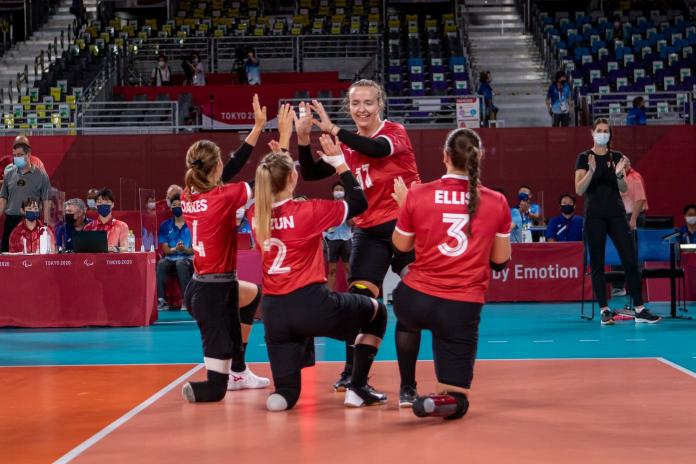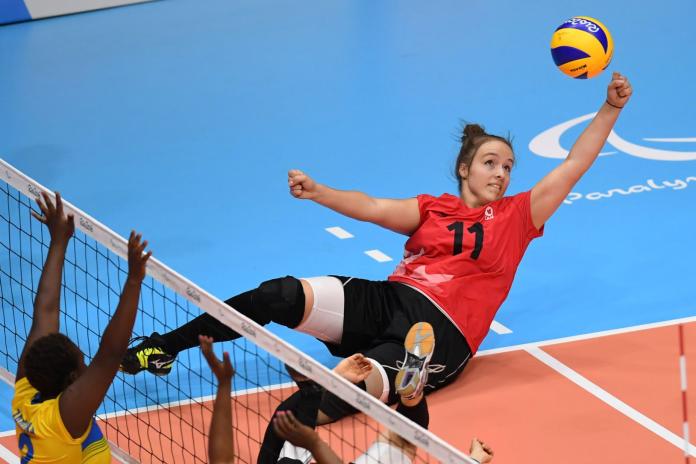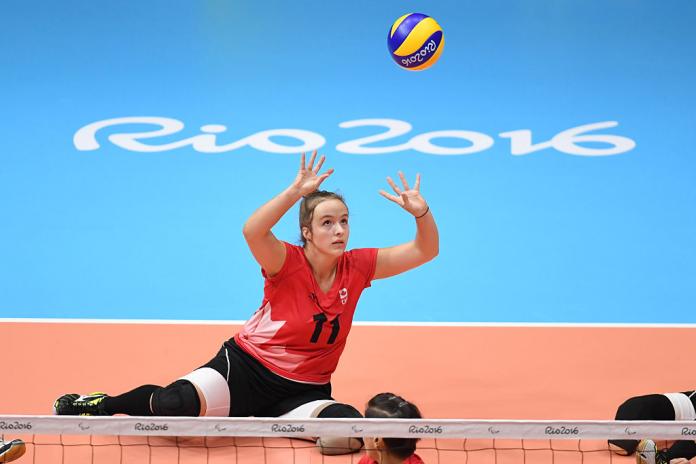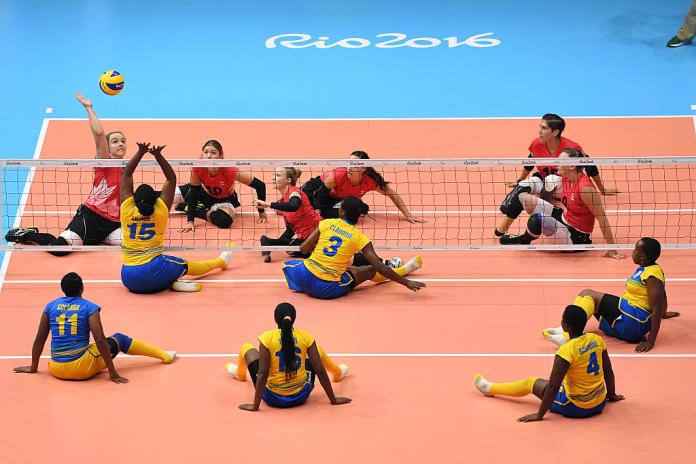From a seventh place at Rio 2016 to playing in the bronze medal match at Tokyo 2020 – Canada’s sitting volleyball star Heidi Peters and her team are on the right path as they prepare to take the podium at the Paris 2024 Paralympic Games.
For the attacker from Neerlandia, Alberta, however, sitting volleyball means much more than chasing medals.
”Volleyball has always been a place I’ve felt most like myself, most happy, and most challenged,” she said.
”When I lost the ability to play my favourite sport I had a gaping hole inside me. Then I found sitting volleyball. It has given me confidence, dreams and a second family.”
A family on court
Having grown up playing standing volleyball, Peters was diagnosed with bone cancer in her left leg when she was in high school. The chemotherapy did not make the cancer go away and the teenager underwent amputation of the leg below the knee.
”I thought I’d never play volleyball again,” Peters said. She was introduced to sitting volleyball by teammate Jolan Wong, who volunteered at the Edmonton Children’s Hospital where Peters was recovering. The pair have now played at two Paralympic Games together.
”Sitting volleyball was a bright light in my life I didn’t know I needed. I have grown and achieved more than I ever thought possible for myself. My team is a family, and these are connections I’ll have the rest of my life,” Peters said.
The biggest challenge in the transition to the new sport was the movement.
”Moving around on the ground is a completely new skillset I had to learn,” Peters said.
However, she quickly adapted to the environment and one year after meeting Wong at the hospital she had made it to Canada’s sitting volleyball team.
A day of a Paralympian
Eight years after making her Paralympic debut at Rio 2016, Peters is now training hard for her third Paralympic Games. She credits her “pure love for the sport combined with incredible coaching” for the success.
Peters, a political science undergraduate student, says she is a bit of a “night owl”. On average, Peters starts her day at 9:00 in the morning.
“I am fortunate to have classes later in the day and only one day of morning practices right now,” she said, adding that “this will change moving into the summer”.
The first thing she does after breakfast is stretching, mobility exercises and physiotherapy for 30 minutes. Then she has schoolwork for a couple of hours before hitting the gym for between 60 and 90 minutes.
Heidi Peters and the women’s sitting volleyball team are headed to Cairo, Egypt to compete in the World Cup and hopefully punch their ticket to #Paris2024! 🏐Learn more about Heidi and the team. Let’s Go Canada! 🇨🇦 https://t.co/0jrF2YoeDz @VBallCanada pic.twitter.com/okVD3jmnPo
— Canadian Paralympic Team (@CDNParalympics) November 9, 2023
She gets home to have lunch, followed by more schoolwork before heading out again for two hours of sitting volleyball training with her team.
After that, she goes home to eat dinner, often ending the day winding down with a good TV show before hitting bed.
During the summer, when she is not in school, a training day would look similar but instead of schoolwork she does content creation for her team’s and her personal social media accounts as well as working on her new podcast.
Peters has a diploma in photographic technology from Northern Alberta Institute of Technology and a diploma in travel from Macewan University – two topics she enjoys very much and does not mind combining. She has worked as a travel agent and loves helping people with their travel arrangements. When she is away on a training camp, however, the focus is on volleyball.
“During a training camp or a centralised training period my schedule will look the same as above but with two practices – morning and evening – and a shorter workout in the afternoon or first thing in the morning for about 30 to 40 minutes,” Peters said.
Training for Paris 2024
Her main aim this year is to improve on her performance at Tokyo 2020, where Canada lost the bronze medal match to Brazil 3-1.
”Therefore, my goal is to win a medal at the Paris 2024 Paralympic Games,” Peters said. “I hope to, along with my teammates, show the world how much we’ve improved. We know we are better every time we compete, and we can’t wait to put it all together and show the world on the biggest stage there is.”
To be able to achieve this, Peters said her team need to “stay present in each moment over the next few months”. Apart from the morning mobility routine, she is also doing three days a week of conditioning training – two off the court and one on the court, as well as three days a week of weight training.
“It’s important to trust the process and stay present while remembering the end goal,” she said.
“That means right now focusing on training, improving on individual goals that will lead to achieving team goals, and staying connected as a team. It means being diligent in everything I do and keeping Paris at the heart of every decision I make for the next months.”
Personally, Peters tries to increase the pace and the accuracy of her serve.
”I work on this by serving against a variety of types of blocks, with a radar gun to track speeds, and at different times throughout practices and drills, to work on implementing the need to make serves under pressure,” she said.
Have you ever been interviewed by a beaver? Well Heidi Peters has and she’s telling Coda all about sitting volleyball! Tune into the 2023 ParaVolley Pan America Zonal Championships on @cbcsports. @VBallCanada pic.twitter.com/WnDANJXyxB
— Canadian Paralympic Team (@CDNParalympics) May 11, 2023
She is also training to become a better and more efficient attacker. “I train this by hitting against a variety of types of blocks in all positions, working closely with my setters for set accuracy, and being put in uncomfortable drills where I need to score to succeed,” she said.
“We can never replicate the pressure, atmosphere, or feeling of a Paralympic match in a training environment. But we can practice performing uncomfortably and that’s what I’m doing.”
Apart from Peters, three Canada teammates and three national team coaches live in Edmonton. She trains with them between three to five days per week.
“We do not have clubs, we just have regional and national team training. I am fortunate that I get to train regionally with my national team coaches,” Peters said.
To wind down she likes to make a good meal, do gardening or photography or hang out with friends or family.
“My core group are a couple best friends and my team. A support system is incredibly important, as is a balance of the personal-, work- and athlete life,” she said.
”This balance helps my mental health and keeps me feeling grounded and well rounded. My parents aren’t in the same city as me but do live close enough to see each other often. They support my athletic endeavours and my mum still preps meals for me if I ask her, when life gets busy.”
With the Paris 2024 Paralympic Games less than 100 days away, Peters is aiming to help Canada win their first medal since the women’s sitting volleyball was introduced at the Paralympics 20 years ago.
“I love this sport with all my heart,” Peters said. “This passion, coupled with coaches who see unlimited potential in me, have given way to hard work, discipline, and a deep desire to be the best I can be.”
Book your tickets for the Paralympic Games by visiting the Paris 2024 ticketing website.



